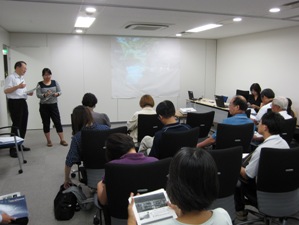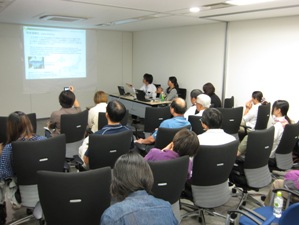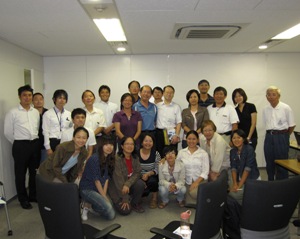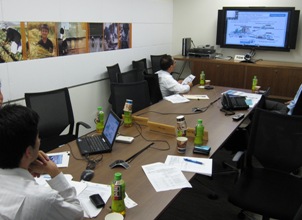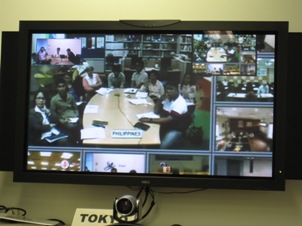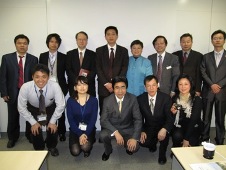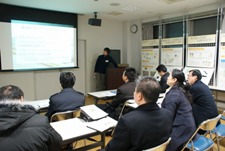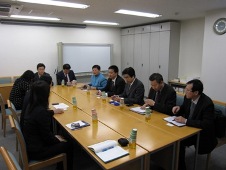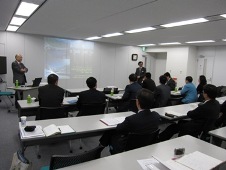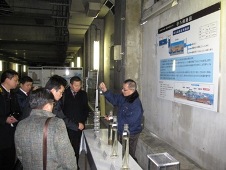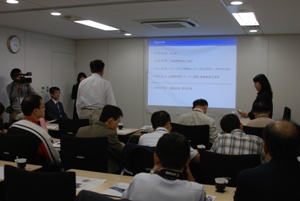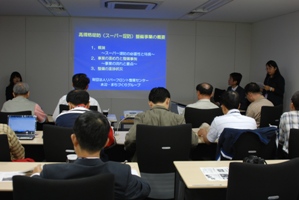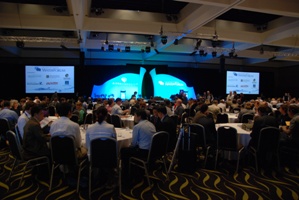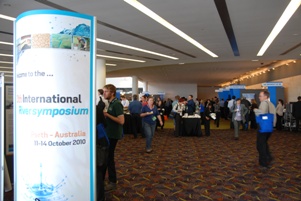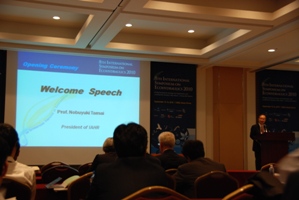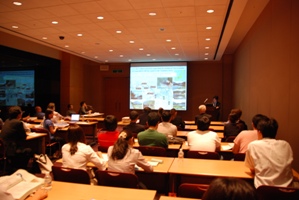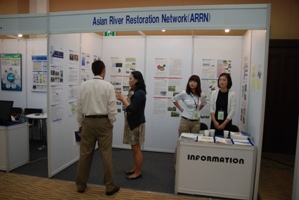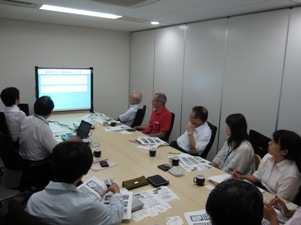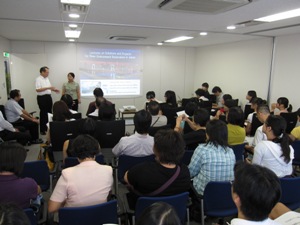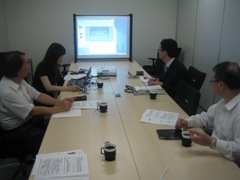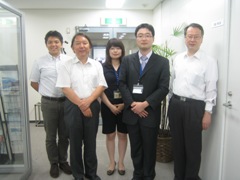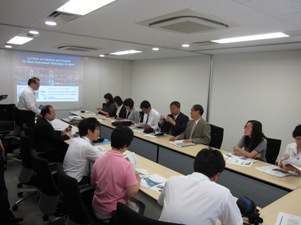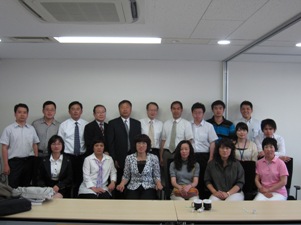
< News and Events Category: JRRN's International Exchange >
|
Opening by JRRN secretary General
|
On August 26, 2011, an inspection delegation in partnership approach of river restoration (about 20 members) came to Japan from Taiwan, and had an exchange with JRRN. Delegation members consisted of community action groups involved in urban river restoration and community development in Taiwan, nationwide citizen’s networks, private enterprises, academic institutes, government officials, public interest corporations, etc.
By JRRN-secre | Category: JRRN's International Exchange | Comment(0) | Trackback(0) |
Date: 2011.08.26 20:07
|
at World Bank Tokyo Office
|
|
TV monitor connected with trainees
|
The World Bank and the Lee Kuan Yew School in Singapore held the second annual local leadership training program “The Decisions, Actions and Results Program (“DARE”)” which provides leadership skills in managing major local government initiatives focusing on urban/river water front transformation.
JRRN secretariat presented Japan’s river restoration cases in the training on 30 May 2011.
-Dr. Kim Woonsoo (Korea) - The Cheonggyecheon river case
-Mr. Toru Hashimoto (Japan) - Yokohama Minato Mirai Waterfront (PDF 11.5MB)
-Kevin Whittle (UK) - London Thames River
-Mr. Masafumi Ito (Japan: JRRN) - Murasakigawa river in Kitakyushu City (PDF 990KB)
-Mr. Akira Wada (Japan: JRRN) - Sumidagawa River in Tokyo (PDF 570KB)
By JRRN-secre | Category: JRRN's International Exchange | Comment(0) | Trackback(0) |
Date: 2011.05.31 19:22
|
Hubei Provincial delegation with JRRN
|
|
at Kuwabukuro biotope Park
|
|
at Japan River Association
|
|
at CTI Engineering Co,LTD
|
|
at Ochiai Water Reclamation Center
|
Technical mission of Hubei Provincial Water Resources Bureau CHINA visited Tokyo from 11th to 13th Jan. 2011, and JRRN secretariat supported their exchange with related organization in Tokyo and their site inspection.
By JRRN-secre | Category: JRRN's International Exchange | Comment(0) | Trackback(0) |
Date: 2011.01.14 19:02
On October 25 (Mon.), 2010, twenty government officials from Pingtung County located in the southernmost part of Taiwan came to Japan, and had an exchange of views regarding overall river development. Pingtung County has recently suffered from disasters. An enormous flood which was supposed to occur only once in fifty years occurred in September last year, and a severe typhoon occurred in September this year. Therefore, the purpose of their visit to Japan was to study case examples and technology required for promoting urban development resistant to water damage. In exchanging views, they asked questions about plans, technology and case examples of river development coupled with urban development in Japan, as well as specific adaptation measures against various phenomena due to global warming including extreme weather and rise of sea level.
By JRRN-secre | Category: JRRN's International Exchange | Comment(0) | Trackback(0) |
Date: 2010.10.26 14:35
The 13th International Riversymposium was held in Perth, Australia, from 11th to 14th of October 2010.
The JRRN Secretariat presented a paper entitled “Development of the Asian River Restoration Network for Knowledge Sharing” in the section called “Moving water through cities”, and mingled with river restoration organizations such as the Australian River Restoration Centre (ARRC).
→Presentation material(PDF 1.2MB)
→Participation Report(PDF 3.9MB) Language: Japanese only available
By JRRN-secre | Category: JRRN's International Exchange | Comment(0) | Trackback(0) |
Date: 2010.10.22 15:15
|
Welcome speech by Prof. Tamai, ARRN chair
|
|
Presentation by JRRN secretariat
|
During the period of September 13 (Mon.) to 16 (Thur.), 2010, the “8th International symposium on Ecohydraulics 2010 (ISE2010)” was held at the COEX in Seoul, Korea.
The JRRN Secretariat sent Mr. Goto (Foundation for Riverfront Improvement and Restoration JAPAN) to the forum to give his presentation, entitled “Characteristics of River Restoration in Japan and Case Studies”, at a technical session of “River Restoration”. During the symposium, ARRN also exhibited a booth to introduce ARRN/JRRN activities and diverse river restoration case examples in Asia.
>>8th International symposium on Ecohydraulics (ISE2010) website
By JRRN-secre | Category: JRRN's International Exchange | Comment(0) | Trackback(0) |
Date: 2010.09.22 17:00
On September 3 (Fri.), 2010, Professor Paul Waley, School of Geography, University of Leeds came to Japan, and had an exchange of views with the JRRN Secretariat and four JRRN members mainly on efforts for river restoration in England and Japan, and the participation of residents. Prof. Waley has continued his relationship with Japan for over three decades. He had covered urban rivers in Japan when he was an English newspaper reporter, and is now working on a comparative study of urban river restoration and involvement with local communities in England and Japan from various perspectives including urban planning, urban development, landscape, and nature-oriented river management.
By JRRN-secre | Category: JRRN's International Exchange | Comment(0) | Trackback(0) |
Date: 2010.09.06 14:33
On August 16 (Mon.), 2010, an inspection delegation in river and urban development (about 40 members) came to Japan from Taiwan, and had an exchange of views mainly on efforts for river environment restoration and urban development starting with the waterfront. Delegation members consisted of community action groups involved in urban development based on rivers in Taiwan, nationwide citizen’s networks, private enterprises, academic institutes, government officials, public interest corporations, etc. The purpose of their visit to Japan was to learn recent efforts for river development in Japan and the involvement of citizens.
By JRRN-secre | Category: JRRN's International Exchange | Comment(0) | Trackback(0) |
Date: 2010.08.16 14:31
On July 6 (Tue.), 2010, a researcher belonging to the Future Resource Institute, a Korean private think tank specialized in water-resource policies, came to Japan, and had an exchange of views on efforts for river restoration and extreme weather conditions with the JRRN Secretariat. The Future Resource Institute was a private organization established as a think tank conducting research on climate change adaptation measures and resource management policies, including water resources, integrated watershed management, environment control, etc. The purpose of his visit to Japan was to collect information and exchange views on environmental measures related to river and water, management methods, and response to climate change, and he visited several related organizations in Japan.
By JRRN-secre | Category: JRRN's International Exchange | Comment(0) | Trackback(0) |
Date: 2010.07.07 14:28
On June 11 (Fri.), 2010, a river inspection delegation from the Dalian Water Authority in Liaoning Province, China (13 members) came to Japan and had an exchange of views mainly on efforts for river restoration. In order to learn recent ideas for river development in Japan and case examples of projects, delegation members planned to inspect rivers managed by local authorities in the Kyushu and Kinki regions, and exchange technology with related organizations in Japan. In Liaoning Province, the “River Channel Ecosystem Construction” was launched in 100 rivers as a three-year project in 2009. Partly for that reason, we had a lively exchange of views about technology, measures and case examples of improvement in river environment.
By JRRN-secre | Category: JRRN's International Exchange | Comment(0) | Trackback(0) |
Date: 2010.06.11 14:22
<< Previous || Next >>
